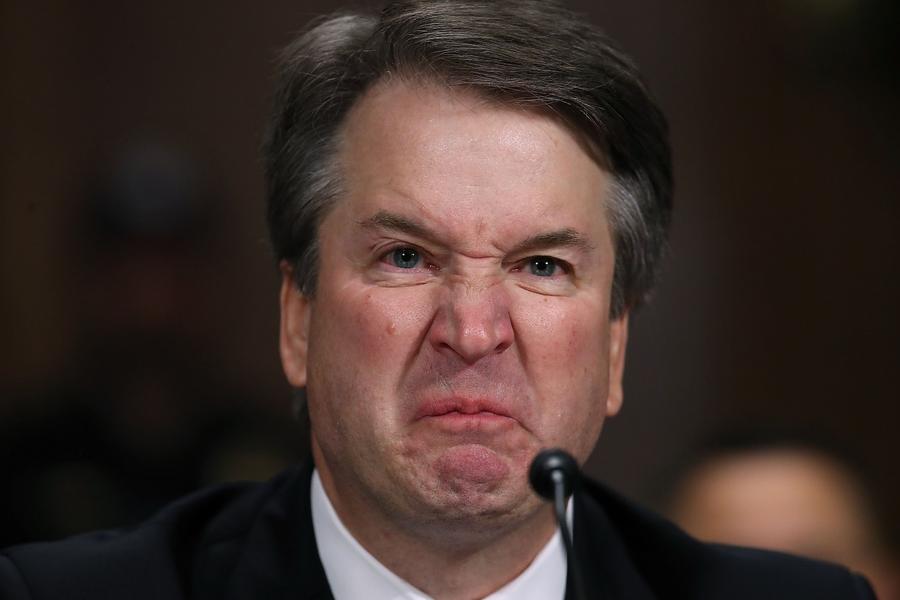What is Brett Kavanaugh's Net Worth and Salary?
Brett Kavanaugh is an associate justice of the US Supreme Court, a position he has held since 2018. Brett Kavanaugh's net worth is $1 million. According to his most recent financial disclosure, Brett came to the court with relatively few assets compared to his colleagues on the bench. His disclosure showed that his main asset is a home that has no mortgage and is worth approximately $1.3 million based on similar comps. Outside of the home, his net worth is less than $100,000. On the plus side, he has almost no debt at all.
Before being appointed to the Supreme Court he worked as a staff lawyer for a number of federal government offices, and served as a circuit judge of the US Court of Appeals for the District of Columbia. During his confirmation hearings for his Supreme Court nomination, Kavanaugh was accused by multiple women of sexual assault, and earned numerous ethics complaints for his ill-tempered conduct.
Early Life and Education
Brett Kavanaugh was born on February 12, 1965 in Washington, DC to Martha, a high school history teacher, and Everett, a lawyer who served a two-decade tenure as president of the Cosmetic, Toiletry and Fragrance Association. Kavanaugh is of Irish Catholic heritage. Raised in Bethesda, Maryland, he went to the Jesuit boys' school Georgetown Preparatory School, where he was captain of the basketball team and cornerback and wide receiver on the football team. After graduating, he enrolled at Yale University; there, he wrote about sports for the Yale Daily News, and was a member of the Delta Kappa Epsilon fraternity. Kavanaugh graduated with a BA in history in 1987. He went on to attend Yale Law School, obtaining his JD in 1990.
Career Beginnings
From 1990 to 1991, Kavanaugh was a law clerk to Judge Walter King Stapleton of the US Court of Appeals for the Third Circuit. He subsequently clerked for Judge Alex Kozinski of the US Court of Appeals for the Ninth Circuit, and then worked as a summer associate for the law firm Munger, Tolles & Olson. Next, Kavanaugh clerked for Supreme Court Justice Anthony Kennedy; he followed this stint by serving as an Associate Counsel in the Office of the Independent Counsel under US solicitor general Ken Starr. After spending time in private practice with the law firm Kirkland & Ellis from 1997 to 1998, Kavanaugh returned to his position under Starr. In 1999, he rejoined Kirkland & Ellis as a partner.
Kavanaugh joined the legal team of George W. Bush in December of 2000 as part of the attempt to stop Florida's ballot recount. Following Bush's inauguration, Kavanaugh became an associate to White House Counsel Alberto Gonzales. He went on to serve as Assistant to the President as well as White House Staff Secretary.
US Circuit Judge
In 2003, Kavanaugh was nominated by Bush to the US Court of Appeals for the District of Columbia Circuit; however, his nomination languished in the Senate for close to three years. He was eventually confirmed in 2006. During his tenure as a circuit judge, Kavanaugh wrote decisions opposing such issues as abortion rights, the Affordable Care Act, and environmental regulation.
Senate Judiciary Committee Hearings
In 2018, Kavanaugh was nominated by Trump to the Supreme Court. His subsequent Senate Judiciary Committee hearings were highly contentious; notably, they included discussions of sexual assault allegations made against Kavanaugh. One of his accusers, Christine Blasey Ford, appeared as a witness. In her testimony, she alleged that, as a teenager, Kavanaugh and a friend had locked her in a bedroom when they were inebriated, and proceeded to grope and disrobe her. Although an FBI investigation was called for, it ultimately omitted key witnesses and information at the behest of the White House. In response to the allegations and the surrounding controversy over his nomination, Kavanaugh became increasingly hot-headed and unruly during his hearings, resulting in 83 ethics complaints against him.

(Photo by Win McNamee/Getty Images)
US Supreme Court
Kavanaugh was eventually confirmed by the Senate 50-48, the second narrowest margin in the history of the Supreme Court. Votes were split along party lines, with only Republican Lisa Murkowski voting no and Democrat Joe Manchin voting yes.
In early 2019, Kavanaugh wrote his first Supreme Court opinion in Henry Schein, Inc. v. Archer & White Sales, Inc. He went on to join the Court's liberal justices in Garza v. Idaho. In other rulings, he has made decisions against abortion rights, certain LGBTQ rights, and voting rights.
Teaching Appointments
Beyond his private practice and federal government work, Kavanaugh has taught courses at Harvard Law School, Yale Law School, and Georgetown University Law Center. In 2019, he withdrew from teaching at Harvard due to the sexual assault allegations against him. That summer, Kavanaugh was a visiting professor at George Mason University's Antonin Scalia Law School.
Sexual Assault Allegations
Kavanaugh has been accused of sexual assault by multiple women, including Christine Blasey Ford, Deborah Ramirez, and Julie Swetnick. Ford, a psychology professor at Palo Alto University, was the highest-profile name to come forward in September of 2018. She accused Kavanaugh of assaulting her in high school by pinning her to a bed, groping her, and attempting to remove her clothes when he was drunk with his friend Mark Judge. Ford testified before the Senate Judiciary Committee. Also in September, the New Yorker published an article detailing another sexual assault allegation against Kavanaugh, this one from his former Yale classmate Deborah Ramirez. Soon, former government employee Julie Swetnick came forward with accusations as well.
Personal Life
In 2004, Kavanaugh wed Ashley Estes, who served as George W. Bush's personal secretary. The couple has two daughters, and resides in Chevy Chase Section Five, Maryland.
/2022/04/Brett-Kavanaugh.jpg)
/2022/06/John-Roberts.jpg)
/2022/04/Elena-Kagan.jpg)
/2020/09/acb-1.jpg)
/2019/09/rbg.jpg)
/2017/05/gorsuch.jpg)
/2020/02/melissa-rivers.jpg)
/2020/11/Yella-Beezy.jpg)
/2020/08/cusack.jpg)
/2023/08/richard-dawson.png)
/2011/08/Doug-Hutchison.jpg)
/2010/07/GettyImages-80351333.jpg)
/2021/01/oldman.jpg)
/2012/11/GettyImages-470080838.jpg)
/2009/12/Mario-Lopez-1.jpg)
/2014/07/GettyImages-688457574.jpg)
/2023/04/Benny-Blanco.jpg)
/2022/04/Brett-Kavanaugh.jpg)
/2017/05/gorsuch.jpg)
/2022/06/John-Roberts.jpg)
/2022/04/Elena-Kagan.jpg)
/2022/03/Ketanji-Brown-Jackson.jpg)
/2019/09/rbg.jpg)
/2023/02/Samuel-Alito.jpg)